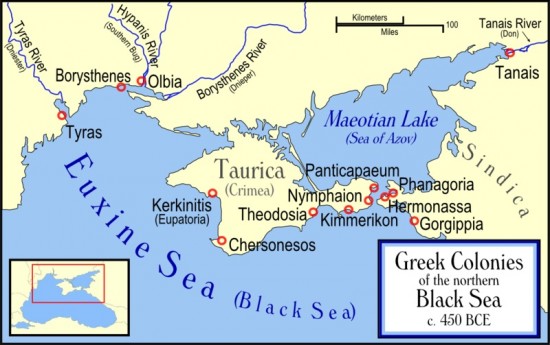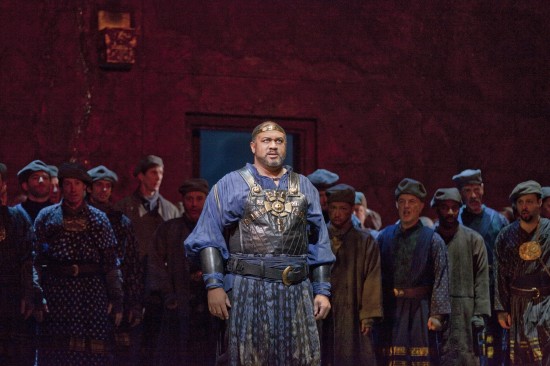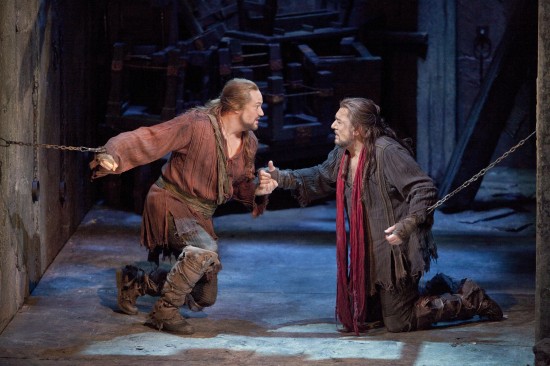The music, singing, acting, and story are all so good that I want to get one of my pet peeves out of the way before I start reviewing the opera. My peeve is not with any aspect of this Met HD production, but with Christoph Willibald Gluck and his librettist Nicolas-Frané§ois Guillard. The story is about a bunch of Greeks, so what business has a Roman goddess got interfering in their affairs? It should be Artemis! But Gluck says Diana, and since I’m reviewing Gluck’s opera, I’ll have to go along with it. But under protest, mind you.
Peeve out of the way, here’s an instant summary of a truly dysfunctional family: King Agamemnon, his wife Clytemnestra, two daughters Iphegenia and Elektra, and a son Orestes. The King sacrifices Iphigenia to the gods (never mind why), so Clytemnestra kills him. Orestes egged on by Elektra avenges his father by killing Agamemnon.
All this took place 15 years ago, but it turns out that Iphegenia wasn’t really killed but had a last minute reprieve by the goddess Diana and is now a Scythian high priestess in Taurica (now Crimea) with the unsavory job of performing the frequent human sacrifices called for by the Scythian’s bloody King Thoas – and Orestes is slated to be her next victim. On to today’s (soap) opera – –
Hostess Natalie Dessay welcomes us to today’s opera, Gluck’s IphigÉnie en Tauride and tells us about that dysfunctional family. The camera switches to the control room and a quiet-voiced technician saying, “Maestro to the pit, please. Maestro to the pit.” (I love that ritualistic start to the Met HD Live performances – it sets my blood tingling in anticipation.) Maestro Patrick Summers mounts the podium, bows to the applause, faces the orchestra, raises his arms, and . . . . Silence. The curtain rises on the sacrificial chamber in the temple at Tauride. Iphigenia (Susan Graham) and the chorus of priestesses are asleep. Suddenly Iphigenia screams in terror and her nightmare is re-enacted: as a young virgin she is seized, carried struggling and thrown on the altar. As the priest raises his arm Diana appears, is lowered on an invisible rope, and snatches her from under the descending knife; they are raised up into the blackness, and disappear as the spot winks out and the music begins. Thus does production director Stephen Wadsworth dramatically bring the audience up to speed by telling us part of what happened 15 years ago.

I’m not much of a musicologist, and I have trouble remembering dates, but as I listened to the overture I thought, Gluck must have written this between Handel and Mozart – and sure enough, according to Wikipedia, Handel’s Xerxes premiered in 1738, Mozart’s The Magic Flute was 1791 – and IphigÉnie en Tauride opened in 1779.
The opera opens with a wonderful thunderstorm. The music builds to one crashing climax after another until it eventually becomes peaceful and serene as the storm ends. Lightning flashes appropriately. The priestesses are all terrified, believing that it signifies the anger of the gods. Choreographer Daniel Pelzig has created a pulsing primitive barbaric ballet that perfectly matches the music and the story.
King Thoas (Gordon Hawkins) marches in with his henchmen and proclaims in a fine bass voice that the gods are angry and want more blood. As if on cue a messenger arrives with news that two shipwrecked Greeks were discovered and subdued with some difficulty. “Bring ‘em on,” says Thoas as he exits, “And you, high priestess, waste no time in sacrificing them both.” Iphigenia thinks, “This is a hell of a job; I wish I were dead,” and becomes more depressed. The Greeks, of course, are Orestes (Plé¡cido Domingo) and his bosom pal Pylades (Paul Grove), but neither sister nor brother recognize the other, and no names are exchanged. End of Act I.
The curtain immediately rises on Act II which takes place in a sort of cell off the main hall of the previous act. In fact, the new scene takes up only the left half of the stage and we can still see the sacrificial altar on the right. Pylades and Orestes are chained to opposite walls but have a nice conversation – in song, of course. Orestes is happy that he will die; it’s the only way that he can escape the furies that are pursuing him. His only regret is that he has caused the coming death of his friend Pylades. “Nonsense,” says Pylades. “My greatest joy is that I shall be with you as I die.” But then guards come and take Pylades away leaving Orestes with only his gloomy thoughts.
He falls into an uneasy sleep and has his own nightmare in which he sees his mother kill his father with stab after stab. Enough to give anyone a nightmare.
Iphigenia has come into the cell when he awakens. She questions him and when she finds out he is from Argos she asks for news of the royal family. Orestes tells her the whole grisly story: the king killed the daughter, the queen killed the king, the son killed the queen, and the son killed himself. This last is not true, of course, but Iphigenia believes it and her depression grows even deeper. On this cheerful note the curtain comes down on Act. II.
Gloom and doom was the mood in the lobby during the only intermission, since we were obviously headed towards closing the deadly circle with, “the daughter kills the son.” Charles had some ice cream to raise his spirits; Letha Ann had some cookies; Sara and I stuck it out.
In Act III Iphigenia bemoans the fact that the noble house of Agamemnon has now petered out since only females are left and resolves to communicate with her sister. She figures that she can get away with letting one of the prisoners escape and carry her letter to Elektra so long as she is expeditious about sacrificing the other. She sits between the two of them at the base of the altar, tells them her plan, and makes both of them promise that the escapee will deliver the letter, gods be willing. Orestes sings that he’s happy to die anyhow and now doubly happy that his death will spare his pal’s life. Pylades sings that no way could he live at the expense of his buddy’s life and my greatest joy will be to save his life by giving my own. Iphigenia sings I wish I could save both of you but I can’t so I have to choose one but I can’t decide which. There follows several minutes of beautiful music in which all three repeat themselves several times with no change of position.
Finally she figures the two guys aren’t going to help her decide so she clamps her hand on Orestes’ knee and says, “Here’s the letter and god-speed.” Pylades is overjoyed with this decision, but Orestes proves a spoil-sport. He seizes the sacrificial knife and holds it to his throat: “If you won’t kill me, I’ll kill myself.”
“Well, if that’s the way you feel about it, I’ll reverse my decision,” says Iphigenia as she retrieves the letter and hands it to Pylades: “Neither rain nor hail nor sacrificial knife shall stay the carrier of my letter.” “I’ll do my best,” he responds, but as he leaves he gives an aside: “No way will I leave Orestes to die in my place. I’ll be back.”
We merge seamlessly into Act IV, but there’s something about this particular stranger and Iphigenia can’t bring herself to kill him. Orestes tries to encourage her saying can’t you see I want you to kill me for, “Iphigenia, beloved sister, thus also did you perish at Aulis.” For a brief moment all is joy as brother and sister are reunited. But . . .
Thoas rushes in more than peeved to find one prisoner escaped and the other still alive. “I can’t kill him; he’s my brother,” exclaims Iphigenia. “If you can’t then I will,” cries Thoas grabbing the knife. “Not so fast,” shouts Pylades rushing in with drawn sword and a small army of Greek slaves he’s persuaded to revolt. For a couple of moments extreme martial music accompanies a fierce battle on stage until suddenly a voice rings out, “Enough already.”
Diana has descended again and takes charge: “Enough blood. The gods are sick of it. Orestes, you have suffered enough in atonement; the furies are called off. Scythians, free all the Greeks, give them back the statue of me that you stole, and let them go home. OR ELSE.”
And they all went to the seashore. Gluck did like his happy endings. So do I.
The Opera Nut
Metropolitan Opera Live in HD
IPHIGé‰NIE EN TAURIDE
Orestes …..
Pylades …..
Thoas …..
Diane …..
First Priestess …..
Second Priestess …..
Scythian Minister …
Clytemnestre …..
Agamemnon …..
TV Director …..
Conductor …..
Production …..
Set Designer …..
Costume designer …
Lighting Designer …
Choreographer …..
Plé¡cido Domingo
Paul Groves
Gordon Hawkins
Julie Boulianne
Lei Xu
Cecelia Hall
David Won
Jacqueline Antaramian
Rob Besserer
Barbara Willis Sweet
Patrick Summers
Stephen Wadsworth
Thomas Lynch
Martin Pakledinaz
Neil Peter Jampolis
Daniel Pelzig
Except as noted, all photos are by Ken Howard, Metropolitan Opera.
This review by Philip G Hodge appeared in sanfranciscosplash.com on April 05, 2011










